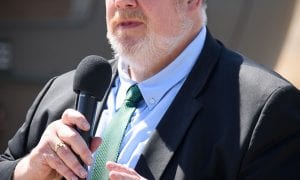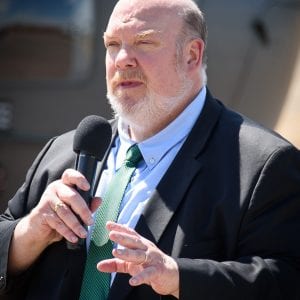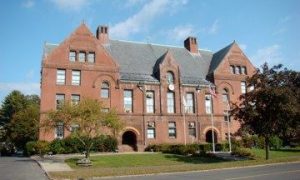WESTFIELD – The City Council narrowly voted to reject a motion to place a Proposition 2 1/2 override question on the November ballot last night.
The motion, sponsored by At-large Councilor David A. Flaherty, was defeated by a 5-8 vote of the members. That vote followed a 6-7 defeat of a motion to table the issue to the council’s July 5 session, to allow the council to get input from the School Committee and School Superintendent Suzanne Scallion, who has opposed Flaherty’s motion.
The question would have allowed citizens to vote on the $2.5 million override for the 2014 fiscal year school budget.
Ward 2 Councilor James E. Brown, chairman of the council’s Legislative & Ordinance Committee which gave no recommendation, said the issue came to the council floor on “short notice because of the time constraints to get it onto the ballot.”
The office of the Secretary of State provides communities with a template to submit a request for Proposition 2 1/2 overrides, underrides and debt exclusion questions. The questions have to be submitted by communities by Aug. 1 to make it onto the November ballot.
Proposition 2½ (Mass. Gen. Laws Ch. 59 § 21) is a Massachusetts statute which limits property tax increases by Massachusetts municipalities. It was passed by ballot initiative in 1980 and went into effect in 1982.
A Proposition 2 1/2 override is a permanent increase in the tax base. The amount of the override is added to the existing tax base and impacts all future tax rates.
A debt exclusion is a temporary increase in the tax base and is used to finance capital projects, such as building construction. The debt exclusion is subtracted from the tax base when the bond for that project is retired.
Proposition 2 1/2 allows a community to reduce its levy limit by passing an underride. When an underride is passed, the levy limit for the year is calculated by subtracting the amount of the underride. The underride results in a permanent decrease in the levy limit of a community because it reduces the base upon which levy limits are calculated for future years. An underride is the exact opposite of a Proposition 2 1/2 override.
As of January 2009, municipalities had requested, via referendum, 4,449 overrides of Proposition 2½, of which 1,798 passed; 16 underrides were requested, of which 9 passed.
Flaherty said that he based the amount of his proposed override on the shortfalls in the school department budget in recent years and because of the loss of $2.2 million in federal grants this year.
“They’re draining their accounts,” he said of the current school budget. “Next year they will be $2.5 million short and will have to cut staff quite deeply if we don’t give them that amount.”
“I’m encouraging you to vote to put it on the ballot and let residents decide,” Flaherty said. “Other towns do this on a regular basis. It’s not unique, not rare.”
“I think it’s the best option. I am not a fan of raising taxes, but it will give citizens with children in school a way to fund the school budget,” he said. “You all have seen how tight the budget is this year. There is no way we can come up with $2.5 million next year.”
Brown said that members of the council have received feedback from a broad range of constituents opposing this ballot initiative.
“The superintendent (Scallion) is not a fan of this,” Brown said. “We have received numerous emails from citizen groups who support the schools, groups who are not in support of this.”
Steve Dondley, a member of Save Westfield Schools, attended the L&O session prior to the City Council meeting, and submitted a statement opposing Flaherty’s motion.
“I am writing to express my misgivings with Councilor David Flaherty’s approach to the Proposition 2 1/2 override vote,” Dondley said. “Before doing that, I want to make clear that I am not writing to encourage or out of hand reject the placement of an override vote before the people. What I am suggesting is that the L&O Committee should consider how to bring forth the override vote in a much more constructive and productive manner.”
Dondley, who also attended the council session, said during a recess that he fears that Flaherty’s approach will divide the community, rather than build a consensus in support of educating the city’s children.
At-large Councilor John J. Beltrandi III said that he would like further discussion and more information on which to make a decision.
“We don’t have to act tonight,” he said. “I don’t feel like writing any more checks for taxes.”
Ward 6 Councilor Christopher Crean said that the override is a “band aid” approach to the problem of balancing departmental budgets.
“I don’t think we’re there yet (where a Proposition 2 1/2 override is justified), that we don’t need to go to that at this point.”
Ward 4 Councilor Mary O’Connell said that the issue is fundamental to democracy.
“The question is should we give citizens the right to vote on this matter?” O’Connell said. “I always favor giving people the opportunity to make these decisions.”
At-large Councilor Agma Sweeney made a motion to table the issue and to invite participation of the School Committee and Scallion in further discussion of the motion. Sweeney’s motion was supported by Beltrandi. At-large Councilor Ann Callahan, Flaherty, Council President Christopher Keefe, and O’Connell.
Opposed to the motion to table were: At-large Councilor James R. Adams, At-large Councilor Brent B. Bean II, Brown, Crean, At-large Councilor Keven W. Harraghy, Ward 5 Councilor Richard E. Onofrey Jr., and At-large Councilor Brian Sullivan.
Adams, Bean, Brown, Callahan, Crean, Harraghy, Onofrey and Sullivan voted against the motion to place the override on the ballot. Supporting that motion were: Beltrandi, Flaherty, Keefe, O’Connell and Sweeney.
For video of the city council meeting, click here.






